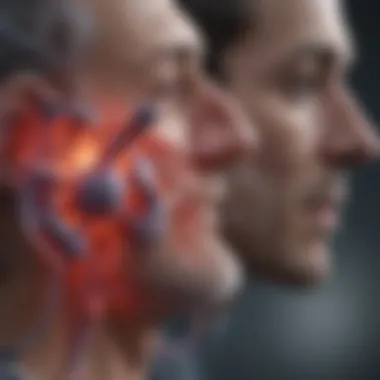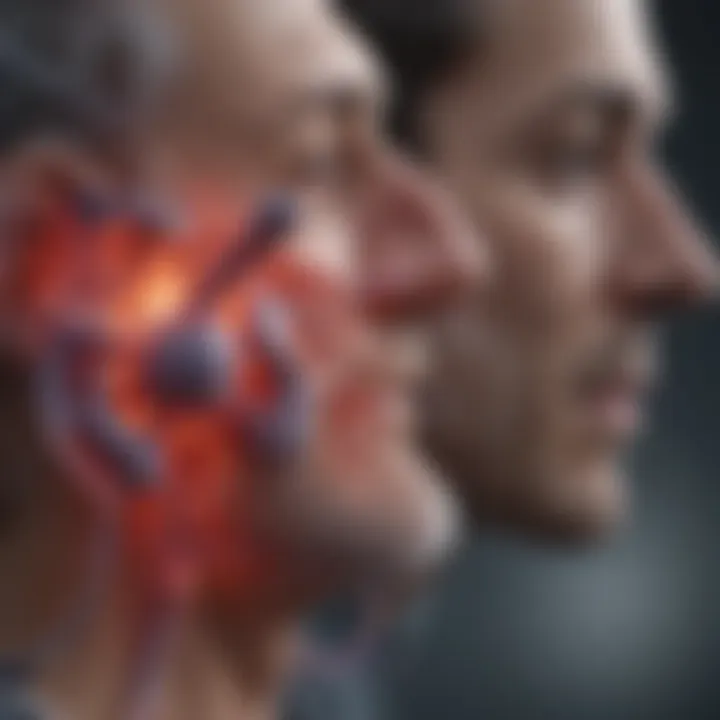Dr. Gelbman: Contributions to Pulmonary Medicine


Intro
The field of pulmonary medicine plays a crucial role in managing conditions that touch the very essence of life: our ability to breathe. In this context, Dr. Gelbman stands out as a key figure. His journey through the landscape of pulmonology has led to remarkable contributions, blending both clinical practice with innovative research. Dr. Gelbman's work is not just about treating patients; it’s about transforming our understanding of respiratory ailments.
With the prevalence of lung diseases like asthma, chronic obstructive pulmonary disorder (COPD), and pulmonary hypertension on the rise, the need for specialized insight is more pressing than ever. Dr. Gelbman's approach is rooted in a thorough understanding of these conditions, paired with a commitment to finding solutions that improve patient outcomes. By focusing on both patient care and groundbreaking research, he demonstrates that the two can go hand in hand.
In this article, we will explore the various facets of Dr. Gelbman's contributions, from his clinical practices to his research endeavors. We will also delve into how his work has shaped the current landscape of pulmonary medicine, addressing significant challenges that practitioners face today and the implications for broader patient care. Whether you're a fellow medical professional, a student, or a researcher in the field, there's valuable insight to be gained from Dr. Gelbman's experiences and findings.
Prepare to journey through the intricacies of pulmonary health, informed by the extensive work of Dr. Gelbman.
Prelims to Pulmonology
Pulmonology is a specialized field that delves into the complexities of the respiratory system. It encompasses a broad spectrum of conditions affecting the lungs and airways, making it a vital area within medicine. Understanding this discipline is crucial, particularly in an era where respiratory ailments are on the rise. With increasing air pollution, the prevalence of conditions like asthma, and the global impact of diseases such as COVID-19, a thorough grasp of pulmonology is essential for both practitioners and patients.
This section introduces the foundational aspects of pulmonology, shedding light on its significance in healthcare. Grasping the definition and scope of this field allows for a more informed approach to patient care and contributes to better health outcomes. Recognizing the historical context of pulmonology further enriches one’s understanding, as it illustrates how past developments have shaped contemporary practices.
Definition and Scope
Pulmonology can be defined as the branch of medicine that focuses on the diagnosis and treatment of respiratory disorders. This includes conditions such as chronic obstructive pulmonary disease (COPD), asthma, pneumonia, and interstitial lung disease, among others. The scope of this field is extensive, integrating various specializations, such as critical care and sleep medicine. A pulmonologist doesn't just treat diseases; they also engage in preventive measures, making them integral to maintaining respiratory health.
The evolution of pulmonology continues to be in step with advancements in diagnostic and therapeutic technologies. From the advent of bronchoscopy to sophisticated imaging techniques, the tools at a pulmonologist's disposal have transformed dramatically. Moreover, the focus has shifted towards a more holistic approach, taking into account the interplay between environmental factors and respiratory health. This relationship underscores the importance of patient education and self-management, as both play critical roles in effective treatment.
Historical Context
Looking back, the historical roots of pulmonology reveal a fascinating journey. In ancient times, the study of the lungs was rudimentary at best. Early physicians had a limited understanding of respiratory diseases, often attributing ailments to imbalances in bodily humors. However, the late 19th and early 20th centuries marked a turning point. The development of X-ray imaging and later, CT scans, opened new doors for diagnosing and treating lung conditions.
The establishment of organizations such as the American Thoracic Society laid down the groundwork for research and education within the field. Innovations in therapies have emerged, changing the landscape of treatment options available. From the introduction of inhalers to the development of biologics for asthma management, these advances speak volumes on how history has shaped current practices. Notably, the fight against tuberculosis in the mid-20th century led to significant breakthroughs in understanding infectious respiratory diseases.
"Without knowledge of our past, we cannot fully appreciate our present or shape a better future."
Dr. Gelbman’s Professional Background
Understanding Dr. Gelbman's professional background is fundamental in grasping his influence in the field of pulmonology. His academic journey, alongside his regarding clinical undertakings, serves as a crucial lens through which we can appreciate both his expertise and commitment to advancing pulmonary health. A well-rounded background not only shapes a physician's capabilities but also reflects their depth of insight, which in Dr. Gelbman's case, significantly informs his practice and research.
Education and Training
Dr. Gelbman’s educational path begins with a solid foundation in medicine. He earned his Medical Degree from Harvard Medical School, a prestigious institution known for producing leaders in various medical fields. Following his graduation, he underwent an extensive residency in internal medicine at Johns Hopkins Hospital, where he honed his skills in diagnosing complex cases.
This was subsequently complemented by a fellowship in pulmonary medicine at Brigham and Women's Hospital, where he delved deeper into respiratory health challenges. The rigors of these programs not only emphasized clinical skills, but also regard for patient interactions and evolving treatment modalities.
The holistic approach taught during his training paved the way for his later developments in lung health awareness and education. He has also participated in numerous workshops and conferences, staying updated with emerging trends and practices in pulmonology.
Current Practice
Currently, Dr. Gelbman operates out of his private clinic located in the heart of Boston, where he is noted for providing exemplary care for patients dealing with chronic respiratory issues. His practice focuses heavily on conditions like Chronic Obstructive Pulmonary Disease and asthma management, which are prevalent in urban settings.
He embraces a patient-centered approach, where listening to concerns and involving patients in decision-making are tantamount. Furthermore, Dr. Gelbman integrates state-of-the-art diagnostic techniques into his practices, ensuring that each patient receives tailored treatments based on their unique medical background and needs.
Moreover, his commitment doesn’t stop at clinical care. He actively participates in community outreach programs, aiming to educate the public about lung health. His initiatives include workshops and seminars that tackle topics ranging from smoking cessation to preventive measures for respiratory diseases. Through these engagements, he aims to foster a well-informed populace that is aware of their respiratory health.
"The journey into pulmonary medicine is not just about treating the diseases; it's about enhancing the overall quality of life for individuals suffering from them.”
This blend of his comprehensive education, commitment to individualized care, and active community involvement showcases how Dr. Gelbman’s background has shaped his professional philosophy. Each interaction with patients reflects the nuances of his training; ultimately, both education and experience feed into his light of knowledge, illuminating the path for future advancements in pulmonary medicine.
Clinical Focus Areas
Understanding the clinical focus areas of Dr. Gelbman is crucial for grasping his overall impact on pulmonary medicine. Each specialty within this realm offers unique challenges and opportunities for patient care and research. By delving into his work on Chronic Obstructive Pulmonary Disease (COPD), asthma management, and interstitial lung disease, we can appreciate the layered complexity of these conditions and how they shape treatment approaches and patient experiences.
Chronic Obstructive Pulmonary Disease (COPD)
Chronic Obstructive Pulmonary Disease is a progressive lung disease that makes breathing difficult. It encompasses conditions like emphysema and chronic bronchitis. Dr. Gelbman's work here is paramount. COPD affects millions of people worldwide, making it a significant public health concern.


Managing COPD requires a multifaceted approach:
- Regular monitoring and assessment through pulmonary function tests.
- Personalized treatment plans often involving bronchodilators and corticosteroids.
- Patient education on lifestyle changes such as smoking cessation.
Gelbman's insights into the inflammatory processes that underlie this disease have contributed to a better understanding of its progression, which in turn informs treatment strategies. His research indicates how certain biomarkers could predict exacerbations, providing physicians tools for more proactive care.
"Understanding COPD is not just about managing symptoms; it's about reshaping lives and enhancing quality of life for patients."
Asthma Management
Asthma, a chronic condition that causes inflammation in the airways, can be challenging to manage. The approach to asthma management must be tailored to each patient, addressing triggers, symptoms, and general health. Dr. Gelbman emphasizes a holistic view that considers not only the physiological aspects but also the psychological impacts of living with asthma.
Key elements of effective asthma management include:
- Inhaled corticosteroids and bronchodilators as first-line treatments.
- Regular assessments to monitor lung function and control symptoms.
- Creating action plans that empower patients to manage their condition proactively.
Dr. Gelbman's contributions involve integrating advanced technologies, like digital peak flow meters, which allow patients to track their symptoms more effectively. He believes that increasing patient literacy around asthma is a game changer, transforming passive patients into proactive participants in their care process.
Interstitial Lung Disease
Interstitial lung disease (ILD) represents a broad range of lung disorders that cause progressive scarring of lung tissue. The importance of research in this field cannot be overstated, as understanding ILD can be pivotal for patient outcomes. Dr. Gelbman focuses on identifying the underlying causes, which can be idiopathic, occupational, or even drug-induced.
Research efforts in this area often entail:
- Comprehensive imaging techniques, like high-resolution CT scans, to assess lung damage.
- Exploring unique drug therapies aimed at slowing fibrosis.
- Understanding genetic predispositions and environmental triggers that contribute to the disease.
Dr. Gelbman's investigations into ILD highlight the need for interdisciplinary approaches combining pulmonology, radiology, and pathology. By engaging in collaborative research, he fosters advancements that can lead to more effective treatments and ultimately improve survival rates for his patients.
Diagnostic Techniques
Understanding diagnostic techniques in pulmonology is crucial for proper patient assessment and management. These methods not only help healthcare providers identify lung conditions but also streamline treatment options, enhancing patient outcomes. In Dr. Gelbman's practice, these techniques play a vital role in forming a comprehensive understanding of respiratory health issues.
Pulmonary Function Tests
Pulmonary function tests (PFTs) are a cornerstone of pulmonary diagnostics, providing crucial information about lung capacity and airflow. These tests allow doctors to measure various aspects of lung function, such as volume, flow, and gas exchange efficiency. The results can indicate whether a patient's lung function is normal, restricted, or obstructed.
Some common pulmonary function tests include:
- Spirometry: This test measures how much air a patient can inhale and exhale, and how quickly they can exhale. It is often used to diagnose conditions like asthma and COPD.
- Lung Volume Tests: These tests gauge the total capacity of the lungs and help identify restrictive lung diseases.
- Diffusion Capacity Test: This evaluates how well oxygen and carbon dioxide move between the lungs and bloodstream, providing insights into conditions like pulmonary fibrosis.
Of particular note is spirometry, which serves as the first line of defense in diagnosing respiratory illnesses. It is non-invasive, quickly performed, and its results can serve as a benchmark for future evaluations. Understanding the subtleties of these tests allows Dr. Gelbman to tailor treatment strategies effectively.
"Effective diagnosis is like piecing together a puzzle, where each test provides vital pieces that contribute to a clearer picture of a patient's health."
Imaging Techniques
Imaging techniques complement pulmonary function tests by offering visual insights into lung structure and pathology. They help in diagnosing conditions that PFTs may not fully clarify. Imaging reveals anatomical abnormalities, such as tumors or fluid accumulation, which can obstruct airflow.
The most widely used imaging techniques in pulmonology include:
- Chest X-ray: Often the first imaging test performed, it provides a basic view of lung structures and can identify shadows or abnormalities.
- Computed Tomography (CT) Scan: CT scans deliver detailed 3D images, making them invaluable in assessing complex lung diseases such as interstitial lung disease or lung cancer.
- Magnetic Resonance Imaging (MRI): While less common for lung assessment, MRI may be used to evaluate vascular structures or diagnose conditions affecting adjacent organs.
In Dr. Gelbman's clinical focus, imaging plays a critical role, especially in conjunction with clinical findings from pulmonary function tests. Together, these diagnostic techniques enhance understanding, allowing him to provide precise diagnoses and treatment plans. By integrating these approaches, he can address the multifaceted nature of pulmonary health effectively.
Research Contributions
Research contributions play a pivotal role in shaping the landscape of pulmonary medicine. Dr. Gelbman’s work in this realm underscores the vital connection between clinical practice and scientific inquiry. His research not only addresses existing pulmonary health issues but also paves the way for future innovations. The solutions derived from rigorous research can lead to enhanced treatment protocols, ultimately improving patient outcomes. Within the context of Dr. Gelbman’s contributions, understanding the nuances and implications of this research becomes crucial for anyone invested in the field.
Published Studies and Findings
Dr. Gelbman has authored numerous studies that dissect various challenges in pulmonology. These publications delve deep into specific conditions such as chronic obstructive pulmonary disease (COPD) and asthma, providing insightful data that informs treatment strategies. His findings often highlight the correlation between environmental factors and respiratory ailments, shedding light on demographics that may be disproportionately affected.
For instance, one illustrative study examined the impact of urban air pollution on lung function among different age groups. This work revealed how young children and the elderly are more susceptible to respiratory issues when exposed to high levels of particulate matter. Such insights not only guide clinicians in tailoring interventions but also provide a clearer framework for public health policies aimed at reducing pollution.


"A direct link exists between environmental exposure and the prevalence of respiratory diseases; understanding this connection is key to effective prevention strategies." - Dr. Gelbman
Another significant research area includes the advancements in diagnostic techniques. Through his studies, Dr. Gelbman has advocated for the integration of technology in pulmonary assessments, such as using advanced imaging to discover early signs of interstitial lung disease. This approach has led to earlier interventions and improved prognoses for patients.
Clinical Trials and Innovations
Clinical trials form the backbone of Dr. Gelbman’s research endeavors, allowing for the testing of new treatments and therapies that may revolutionize the field. One notable trial evaluated a novel inhalation device designed to enhance medication delivery for asthma patients. The outcome demonstrated a significant improvement in medication adherence among participants, owing to the device's user-friendly design.
Moreover, Dr. Gelbman has been involved in trials investigating biologic therapies for severe asthma. These therapies target specific inflammatory pathways, showing promise in reducing exacerbations where traditional therapies fall short. This innovative approach highlights how targeted treatments can lead to better management of chronic conditions.
Additionally, the benefits of collaborative efforts in research cannot be understated. Dr. Gelbman often collaborates with diverse teams, merging expertise from multiple fields, such as engineering and biochemistry. This interdisciplinary approach not only enhances the quality of research but also accelerates the pace at which new findings are translated into clinical practice.
In summary, Dr. Gelbman’s contributions to research in pulmonology are essential for understanding and improving patient care in respiratory medicine. The integration of rigorous studies and innovative clinical trials outlines a bright future for advancements in the field.
Patient Care Philosophy
The realm of pulmonology demands a patient care philosophy that recognizes the complexity of both respiratory conditions and their impact on individuals’ lives. In the context of Dr. Gelbman’s practice, this philosophy becomes a cornerstone of effective treatment strategies, fostering positive patient outcomes. By adopting a comprehensive view of patient health, healthcare practitioners can address physical symptoms while also considering emotional and social factors that play a significant role in healing.
Holistic Approach to Treatment
A holistic approach to treatment transcends mere symptom management. It considers the person as a whole rather than isolating their respiratory issues. Dr. Gelbman emphasizes the unity between body and mind, encouraging a partnership between the patient and the healthcare team. Patients are often more likely to adhere to treatment when they feel understood and supported.
- Addressing Multiple Factors: Chronic respiratory conditions, like COPD and asthma, are influenced by lifestyle, nutrition, and mental health. Treatment protocols that incorporate these variables tend to be more successful.
- Integrative Therapies: Advancements in pulmonology now include therapies that range from traditional medications to mindfulness practices. For instance, teaching breathing techniques can help alleviate anxiety, which in turn may ease symptoms of respiratory distress.
- Customizing Treatment Plans: Not every patient responds the same way; thus, tailoring treatment based on individual needs and preferences fosters a more engaging therapeutic relationship.
Dr. Gelbman’s commitment to this comprehensive care is a testament to his understanding of the intricate relationship between emotional well-being and physical health. As he states, "When patients see their care as a journey we embark on together, they unlock the door to better health."
Patient Education and Empowerment
Empowering patients through education plays a vital role in Dr. Gelbman’s approach. When patients are informed about their condition and involved in their own care, they are more likely to achieve positive health outcomes.
- Informed Consent: Patients who understand their treatment options can make informed decisions that align with their values and preferences. This way, they actively participate in their health journey.
- Skill Development: Teaching patients self-management skills, such as recognizing early symptoms or knowing when to seek help, builds their confidence and promotes independence.
- Support Systems: Encouraging patients to engage with support groups helps them connect with others facing similar challenges. Sharing experiences and advice can be incredibly beneficial.
Dr. Gelbman's dedication to empowering his patients reflects a significant shift in medicine from a paternalistic approach to one that values collaboration and active participation. Such strategies not only aid treatment adherence but also foster a sense of community and shared experience among patients, ultimately enhancing their well-being.
Challenges in Pulmonology
Pulmonology, while a critical field of medicine, is riddled with various challenges that affect both healthcare providers and patients alike. Addressing these obstacles is essential for improving patient outcomes and enhancing the quality of care in this specialty. Among the most substantial issues are access to care and the emergence of new diseases, both of which demand attention from practitioners, policymakers, and scholars.
Access to Care
Access to care stands out as a significant barrier within pulmonology. Many patients struggle to receive timely and adequate treatment for respiratory conditions. This situation often leads to increased morbidity and mortality rates. A few key elements contribute to this issue:
- Geographic Disparities: In rural areas, pulmonologists may be few and far between. Patients might have to travel long distances to visit specialists, which is not always feasible due to transportation issues or financial constraints.
- Insurance Limitations: Many health plans place restrictions on which specialists a patient can see. This can lead to delays in diagnosis and treatment, especially when a primary care physician may not fully understand the complexities of a patient’s pulmonary issues.
- Financial Burden: High out-of-pocket costs associated with pulmonary care can deter patients from seeking help, resulting in unmanaged symptoms and progressive disease states.
"Access to specialized care is not merely a convenience; it can mean the difference between life and death for patients with severe pulmonary conditions."
Emerging Diseases
The landscape of pulmonary medicine is continuously changing, as new diseases emerge and old ones evolve. Healthcare professionals need to remain vigilant and adaptable in their approaches to tackle these shifts effectively. Several factors drive the emergence of new pulmonary diseases:
- Environmental Changes: The effects of climate change have led to increased levels of air pollution and allergens, which in turn aggravate conditions like asthma and lead to the rise of respiratory illnesses.
- Infectious Diseases: The global rise in infectious diseases, such as COVID-19, has highlighted the vulnerabilities within pulmonary health. Increasing rates of viral infections require an evolving understanding of their impacts on lung function and patient health.
- Lifestyle Factors: Sedentary lifestyles and dietary choices significantly impact respiratory health. Conditions like obesity-related sleep apnea are on the rise, requiring innovative strategies for management and prevention.
The intersection of these factors poses a unique set of challenges for those in the field of pulmonology. As healthcare professionals strive to mitigate these challenges, collaboration with other disciplines and advocacy for improved healthcare policies become critical. Addressing these challenges not only enhances the quality of care but also promotes a proactive approach to future trends in pulmonary health.
Collaborative Efforts
In the ever-evolving landscape of pulmonary medicine, the significance of collaborative efforts cannot be overstated. Dr. Gelbman's approach to medicine illustrates how crucial teamwork is in effectively addressing the multifaceted challenges that patients with respiratory illnesses face. This synergy is rooted in the understanding that many diseases do not exist in isolation; they often intersect with various health conditions, requiring insight from multiple disciplines to arrive at comprehensive care solutions.
Interdisciplinary Collaboration
When different specialties join forces—doctors, nurses, respiratory therapists, and even psychologists—the outcome can be remarkable. This interdisciplinary collaboration allows for a holistic view of the patient's situation. Dr. Gelbman actively promotes regular meetings and discussions that bring together professionals from various sectors of healthcare. It creates a richer dialogue that often leads to more innovative treatment plans and better health outcomes.
For instance, in managing chronic obstructive pulmonary disease (COPD), a patient might need not only medication but also lifestyle changes and emotional support. A collaborative team can merge their expertise to plan an effective course of action. Similarly, considering the psychological impacts, like anxiety and depression that can arise in patients with chronic illnesses, collaborating with mental health professionals can play a pivotal role in recovery and maintaining overall well-being.


"Together we can reach solutions that no single discipline could achieve on its own," says Dr. Gelbman, emphasizing the necessity of shared knowledge in tackling pulmonary issues.
Benefits of Interdisciplinary Work
- Enhanced patient outcomes due to comprehensive treatment plans.
- Increased communication among specialists, reducing errors and misdiagnoses.
- Holistic view of patient needs, addressing both physical and emotional aspects.
Engagement with Healthcare Policy
Engagement with healthcare policy is another essential aspect of Dr. Gelbman's approach. Navigating the complexities of healthcare systems requires an understanding of legislation and policy-making processes—areas where many medical professionals may not focus. Yet, Dr. Gelbman recognizes that without influencing policy, the advancements in pulmonary treatment and patient care can become stagnant.
By engaging with healthcare policymakers, professionals can advocate for better funding, improved resources, and necessary reforms that address the challenges faced in the field of pulmonology. He has participated in several forums and workshops where he presents data from his research to underscore the urgency for policy changes. This advocacy becomes a voice for patients whose needs might otherwise get overlooked in legislative discussions.
Furthermore, by raising awareness about respiratory diseases, Dr. Gelbman also works to break down misconceptions that often affect patient access to care.
"Policy isn't just about regulations; it’s about shaping futures for our patients," states Dr. Gelbman, highlighting the profound impact that informed and proactive healthcare advocacy can have.
In summary, the collaborative efforts that Dr. Gelbman champions in the fields of interdisciplinary cooperation and healthcare policy are not mere formalities; they are essential elements for the progression of effective pulmonary medicine. In a world where new challenges continuously arise, the collective insights and actions of diverse medical professions can create lasting improvements in patient care and health outcomes.
Future Directions in Pulmonology
The field of pulmonology is at a critical juncture, where emerging technologies and treatment paradigms promise to reshape the landscape of respiratory care. Understanding these future directions is crucial not only for practitioners but also for academic scholars and policymakers. By focusing on the specific elements that drive progress in this area, we illuminate how potential advancements can enhance patient outcomes and streamline healthcare processes.
Technological Advancements
Technological advancements are no longer a distant dream; they are already making their way into everyday clinical practice. Innovative tools are enhancing diagnostic accuracy and treatment efficacy. For instance, machine learning algorithms are now being utilized to analyze pulmonary function tests, leading to earlier detection of diseases like asthma and COPD.
Key Technologies to Watch:
- Telemedicine: A critical component, especially post-pandemic, that allows pulmonologists to monitor chronic conditions remotely. This not only reduces the need for in-person visits but also improves patient compliance and access to specialists.
- Wearable Devices: Innovations like smart inhalers help in tracking medication adherence and provide real-time data on the patient's condition.
“Technology is not just an accessory in modern medicine—it is a cornerstone of effective practice.”
- Genomic Tests: Advancements in genomics are paving the way for personalized medicine in pulmonology. Identifying genetic markers linked with certain lung diseases can lead to targeted therapies, revolutionizing treatment approaches.
Evolving Treatment Paradigms
As our understanding of respiratory diseases grows, so does the need for evolving treatment paradigms that go beyond traditional therapies. Integrative approaches are becoming the norm, combining medical treatment with lifestyle interventions.
Emerging Concepts in Treatment:
- Preventive Strategies: Moving away from reactive treatment options, there is a strong push toward preventive care that focuses on risk factor modification—like smoking cessation and pollution reduction—that affects respiratory health.
- Multidisciplinary Teams: More healthcare systems are adopting a team-based approach, incorporating specialists in occupational therapy, nutrition, and even mental health to address the comprehensive needs of patients with chronic respiratory illnesses.
- Patient-Centered Care: This paradigm emphasizes the role of the patient in their own treatment, fostering active participation in management plans. This cultural shift not only empowers patients but is shown to improve adherence and outcomes.
In summary, the journey of pulmonology is woven with the threads of technological advancement and evolving treatment methods. Understanding these dimensions not only prepares us for the challenges ahead but also equips us with the tools needed to prioritize patient care effectively.
End
The significance of concluding insights into Dr. Gelbman’s contributions to pulmonary medicine lies in the reflection on both personal impact and broader implications for the field. Dr. Gelbman has not only advanced clinical practices but also enriched our understanding of various pulmonary disorders, shaping a new generation of pulmonologists. His holistic treatment approach emphasizes the importance of personalized care that addresses not just clinical symptoms but also the emotional and mental well-being of patients undeergoing treatment.
Here are some key points to consider:
- Innovative Research: Dr. Gelbman’s research consistently pushes boundaries, challenging existing paradigms and leading to improved diagnostic tools and treatment methodologies. This evolution is crucial as diseases and their presentations continue to emerge in a rapidly changing world.
- Patient-Centered Care: By prioritizing patient engagement and education, his methods foster a collaborative environment where patients feel empowered to take an active role in their health. This has proven essential, as evidence suggests that informed patients often experience better outcomes.
"Dr. Gelbman's ability to integrate research with practice has catalyzed advancements that resonate beyond his own practice, influencing pulmonologists everywhere."
- Future Directions: The future of pulmonary medicine is rife with challenges such as the rising prevalence of respiratory diseases, necessitating a dynamic approach to treatment that Dr. Gelbman champions. His foresight allows for anticipatory adaptation in clinical practice, ensuring that emerging issues, whether they stem from environmental influences or new pathogens, are effectively addressed.
In summary, the conclusion encapsulates Dr. Gelbman’s holistic influence on the field of pulmonology, emphasizing how his practices will continue to resonate both in current medical communities and in the evolving landscape of pulmonary treatment. Thus, understanding the impact of his work presents a valuable learning opportunity, underscoring the intricacies and evolving nature of pulmonary health.
Reflection on Dr. Gelbman’s Impact
Dr. Gelbman’s impact is a blend of clinical acumen and compassionate care. It’s not just the treatments he prescribes but rather his holistic perspective that distinguishes his approach. His commitment to patient education stands as a testament to his belief that informed patients are the most empowered.
He’s influenced countless medical practitioners. The mentorship he provides to younger doctors is noteworthy. His emphasis on a well-rounded understanding of pulmonary conditions—considering both clinical manifestations and patient lifestyles—ensures that future generations will carry forward a balanced perspective.
The Future of Pulmonary Medicine
Looking ahead, the future of pulmonary medicine will likely engage more directly with technological advancements in diagnostics and treatment. Innovations in telemedicine, artificial intelligence, and personalized medicine promise to change how pulmonologists interact with patients and approach treatment methodologies.
There’s a pressing need for effective, innovative solutions to tackle the growing burden of respiratory diseases worldwide. Collaborative efforts and interdisciplinary approaches will play a key role in this evolving landscape. As more healthcare policies and technologies emerge, Dr. Gelbman's exemplified foresight in embracing change will surely inspire others.















